Deconstructing Hollywood … for laughs: Hellzapoppin (1941)
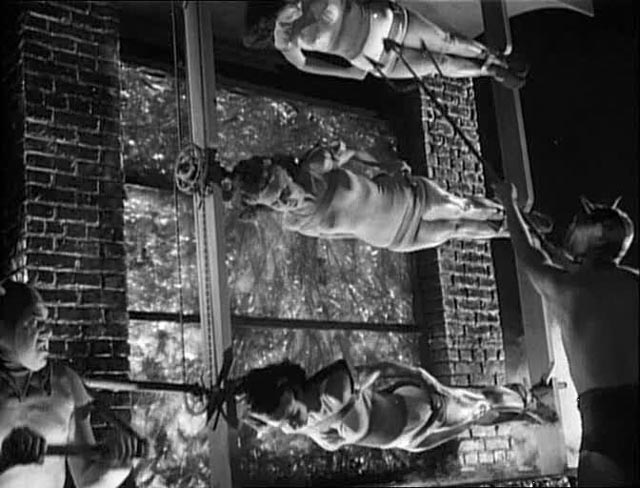
A friend who teaches film to university students occasionally offers a course in comedy. He’d originally thought it would be fun, but was quickly disillusioned. Of course, comedy, more than drama, tends to be specific to its context as jokes are frequently dependent on shared cultural referents. So these student fans of Adam Sandler, American Pie, The Hangover and YouTube hits-to-the-crotch videos turned out often to be unresponsive to things which my friend finds hilarious. They generally hate W.C. Fields, surprisingly laugh at bits of Jerry Lewis … and at what was unquestionably the lowest point of his experience to date, told him that Alexander Mackendrick’s Ealing masterpiece The Ladykillers was the worst movie ever made (all except a few of them walked out of the screening).
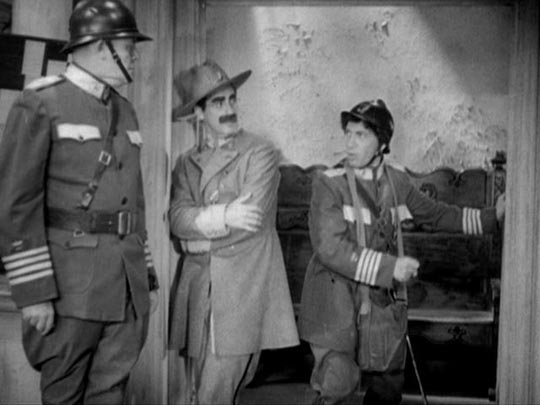
There has often been a tension in comedy cinema between the genre’s tendency towards anarchy and social disruption and the needs of the business to maintain acceptable standards of order. You can see this played out in the early movies of the Marx Brothers, with their initial films shattering social norms beyond repair. Their first five films, produced by Paramount, are odes to chaos, climaxing with their masterpiece, Duck Soup (1933, directed by Leo McCarey). Their subsequent move to MGM, with Sam Wood at the helm, gave them bigger budgets but less freedom; though A Night at the Opera and A Day at the Races feature some classic Marx sequences, these films seem ponderous compared to the Paramount features and the brothers are too often sidelined by insipid romantic subplots and musical numbers. The bigger studio, in fact, seems to have suspected that they were a little too dangerous and deliberately set out to tame them.
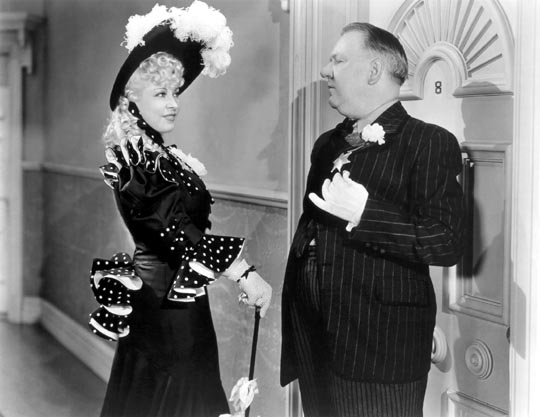
in My Little Chickadee
More obviously, performers like W.C. Fields and Mae West were quickly reined in by the Breen Office once the production code came into effect. The anarchic freedom of the silent years – Mack Sennett, Buster Keaton, even Charlie Chaplin – mostly survived in shorts once sound arrived, the flag of disorder perhaps most consistently flown by the Three Stooges. In features, screwball comedies managed to remain subversive while focusing almost exclusively on romantic conflicts, as if their characters were struggling against the conservative constraints of courtship and marriage which were being imposed on them (there are a number of screwball classics in which bourgeois married couples break up, undergo massive confusions, and eventually reconnect … but now on their own terms rather than society’s).
The contemporary comedies enjoyed by my friend’s students offer superficial indications of transgression – generally of the fart joke, bodily fluid, bad language kind – but tend towards a deep conservatism, a re-establishment of social norms as something both necessary and desirable. (Compare these with Bruce Robinson’s brilliant Withnail and I, in which the inevitability of “growing up” and joining society is faced with a deep sense of sadness and loss.)
All of which is a very roundabout way of getting to a movie called Hellzapoppin …
Hellzapoppin (1941)
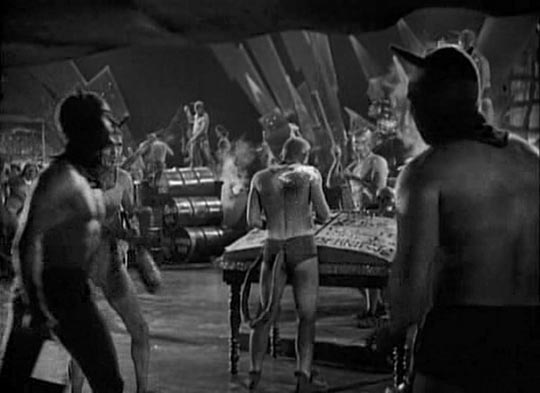
The narrative core of Hellzapoppin, directed by H.C. Potter in 1941, is a routine musical romance, much like dozens of other program fillers of the period. Jeff Hunter (Robert Paige) loves Kitty Rand (Jane Frazee), the daughter of a wealthy family, but he can’t declare his feelings until he’s made a success of himself with a theatrical revue he’s written; Kitty loves him back, but her engagement to dull Woody Taylor (Lewis Howard) is about to be announced at a big house party at her parents’ estate. Jeff’s friends Ole (Ole Olsen) and Chic (Chic Johnson) are helping him to put on a benefit performance of his show on the grounds of the estate, hoping to impress a famous Broadway producer – if the show’s a success, Jeff can ask Kitty to marry him …
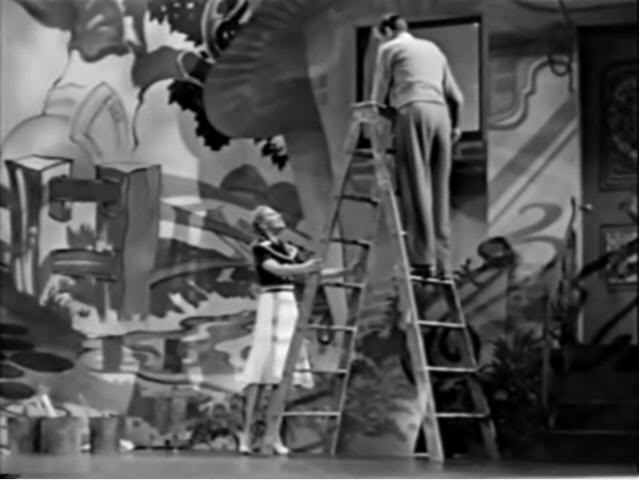
There are, of course, numerous complications and misunderstandings (when Ole and Chic get the mistaken idea that Kitty is actually a “bad girl”, they set out to sabotage the show to save Jeff from making a “mistake”) and various subplots. The biggest of the latter is the storyline involving Pepi (Mischa Auer), a Russian prince pretending to be a phoney Russian prince (the phoniness amuses the society people he sponges off, where they would have no interest in him if they knew he was genuine) and Betty (Martha Raye), Chic’s brassy sister, whom the prince mistakes for a wealthy heiress.
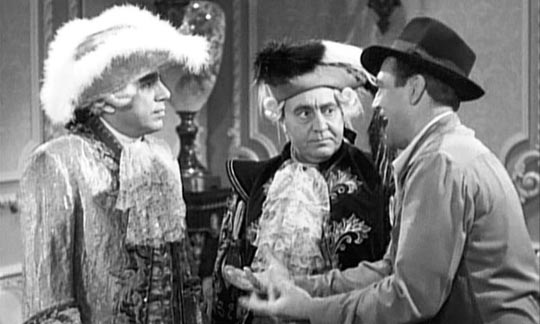
So – nothing particularly original in the story. What makes Hellzapoppin remarkable is the way the story is told. The film was nominally based on a successful Broadway production created by the comedy team of Olsen and Johnson. Apparently, the stage show consisted of a collection of vaudeville acts and musical numbers which the pair would improvise around and comment on. Although there are musical numbers and verbal and physical gags in the movie which hint at those origins, writer Nat Perrin came up with a whole new structure focused on studio movie-making. Not only does that structure literally embody the conflict between anarchy and containment, it also playfully yet incisively deconstructs the mechanisms of studio filmmaking.
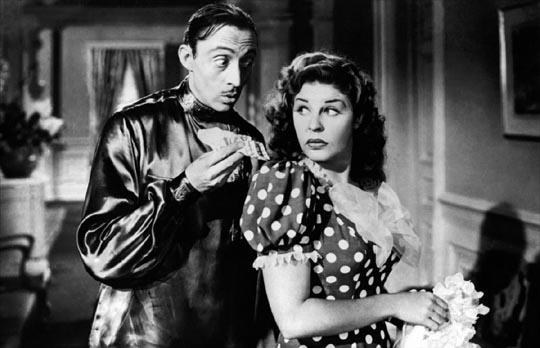
I’ve read about Hellzapoppin for decades, but just recently saw it for the first time (thanks to Glenn Erickson at DVD Savant, who passed on a link to a complete copy of the film on YouTube). Although the person who posted it claims that it’s now in the public domain, the quality of the print used for the transfer is surprisingly good and it’s well worth checking out not simply as an historical curiosity, but also as an often inspired piece of – for want of a better word – post-modern (avant la lettre) film-making, foregrounding the processes of its own production. [Note (2016): that copy has since been deleted from YouTube, unfortunately, but now there’s a version which has been crudely colourized to a point where it’s hard to watch without damaging your eyes.]
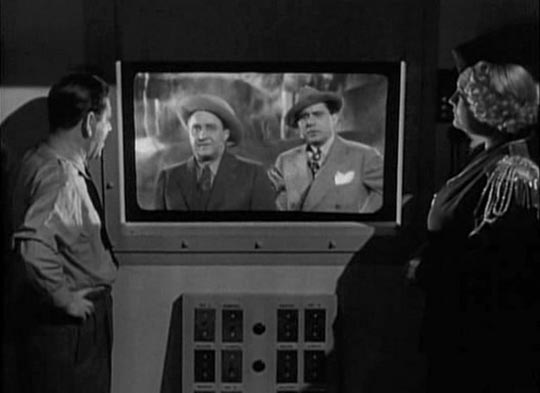
The opening title sequence is an elaborate musical number taking place in Hell, with demons tormenting condemned souls with pitchforks and fire. Into this, Ole and Chic arrive in a taxi. As things escalate, the cab explodes … and the pair yell at the projectionist to rewind the film. Up in the booth, Louis the projectionist (Shemp Howard) is having a bit of an argument with a very large usherette he seems to be hitting on, and he responds irritably to the demands of the two guys on screen; but he finally does rewind the scene, which quickly runs backwards to a point before the explosion – then plays again, but with different action … the projector rewriting what we’ve already seen.
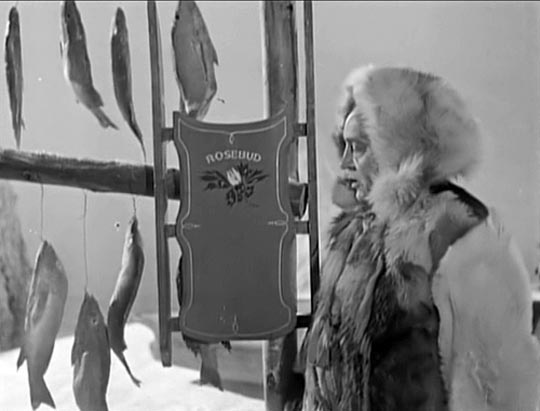
There’s a call for “cut!” and the camera pulls back to reveal a soundstage where the irritable director has had enough. He, Ole and Chic proceed to walk through a series of sets, with their costumes changing to suit each one in a seamlessly fluid sequence which looks very much to have been the inspiration for Chuck Jones’s great Daffy Duck cartoon Duck Amuck! (1953). There are visual and verbal gags on each set. The most notable has them passing an igloo beside which a small sled hangs from a pole above the snow – we see the word Rosebud painted on it and one of the boys says in passing “I thought they burned that”; Hellzapoppin was released less than four months after Citizen Kane.
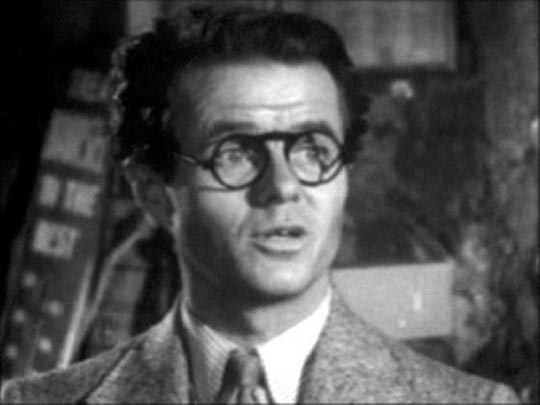
Eventually they end up on another stage where timid writer Harry Selby (Elisha Cook Jr) starts to tell them the story of his script – which is the story of Jeff and Kitty … as he speaks, the opening scene is projected on the wall behind them and Ole and Chic speak with their “on-screen” selves. For the rest of the film, these two characters within the romantic musical keep breaking the fourth wall, talking to the audience and the projectionist, and occasionally the Ole and Chic in the framing studio set-up interact with the “on-screen” events.
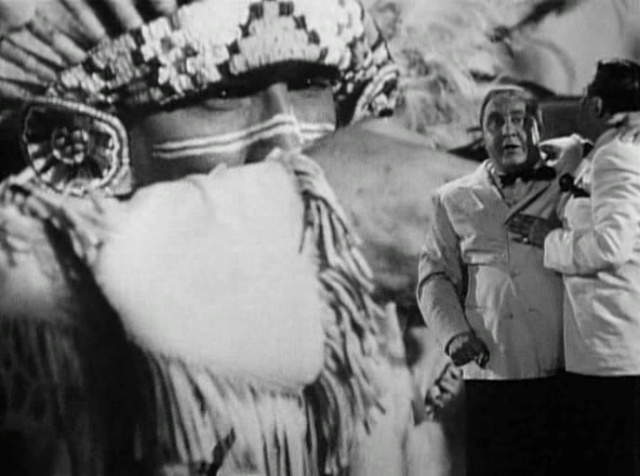
Various visual gags include (like many classic Warner cartoons) disruptions of the frame, with characters having to communicate across a frame line in the middle of the screen, even using their own strenuous efforts to shift the frame line back into place; the picture turning upside down, freezing, running backwards; at one point the projectionist mixes up the reels and Ole and Chic get caught in a western; a little later one of the Indians rides onto the country house grounds … There are numerous pratfalls (most involving Auer and Raye) and verbal gags (the prince makes his mistake about Betty because of the double meaning of “ice” [frozen water/diamonds]).
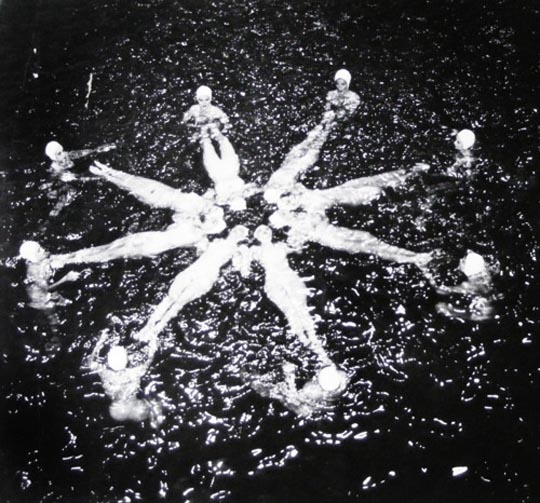
At one point the camera pans with Ole and Chic as they walk past the swimming pool; when a young woman in a bathing suit appears in the frame, the pan stops and Ole and Chic walk out of frame. Beat. They come back and yell up at the projectionist to keep his mind on what’s important and the pan continues. This confusion – or conflation – of the camera with the projector occurs several times in the movie, blurring the lines between production and exhibition … and suggesting that the act of viewing is not passive, that despite the assumption of control that the filmmakers might possess, an audience’s eyes are free to pick and choose what they focus on.
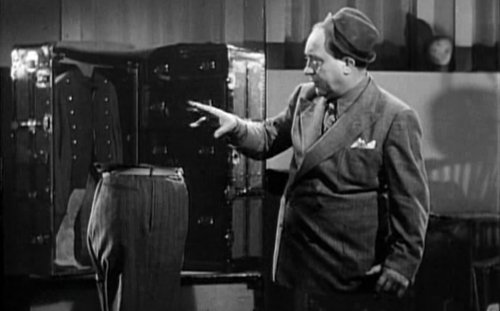
In the climactic sequence, Ole and Chic attempt to disappear with the help of the constantly changing detective Quimby (Hugh Herbert), who has appeared as a running gag throughout the movie. It turns out that he’s actually a stage magician and he shows the pair how to “disappear” literally, although things go wrong and one of them vanishes from the waist down, the other from the waist up. This provokes some impressive visual gags from Universal’s brilliant effects man John Fulton in which the two half bodies keep appearing to complete each other, only to drift apart again.
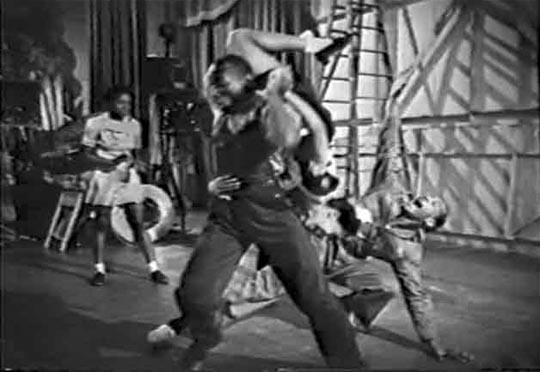
Jeff’s show is a rather bland musical revue with Busby Berkeley-esque numbers, contrasted at one point by a high energy dance number spontaneously performed backstage by the “Negro help” (Whitey’s Lindy Hoppers). The show itself is disrupted and transformed by various intrusions engineered by Ole and Chic, reflecting the constant disruptions of the movie narrative – but those disruptions actually turn the mediocre show into something inadvertently entertaining, reaffirming the idea that accident and contingency can be more creatively productive than authorial intent. Comedy comes out of the chaos in direct opposition to the forces of control.
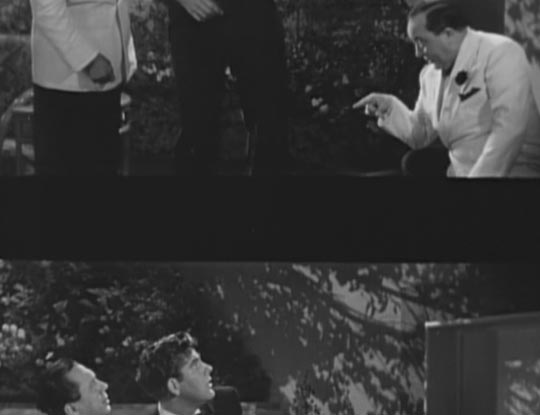
And, in a compounding effect, all the disruptions caused by the meta-narrative devices have the effect of reinvigorating the stale romantic storyline, maintaining viewer interest despite the predictable familiarity, while the film itself never takes it seriously. In fact, as the whole thing finally disintegrates, we end up back in the studio where the director, disgusted with this trite script, shoots the writer.
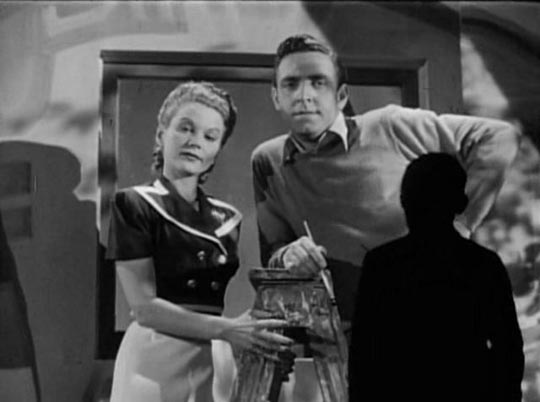
And so, at the height of the studio system, two vaudevillians and a successful theatre director with a fairly undistinguished movie career gleefully deconstructed the mechanisms of mainstream movie storytelling, exposing the arbitrary elements of a typical narrative … and reconstituting them in such a way that, while revealing their essential silliness, Potter, Olsen and Johnson make them seem fresh and spontaneous. Hellzapoppin works both on the level of chaos and on the level of contained, conservative entertainment … but in the end, unlike too many contemporary comedies, it has no interest in re-establishing social norms.
Comments
Your assessment of the Marx films is daft. The Thalberg films are arguably their best. They were both smash hits at the box office and critical darlings. Groucho was particularly pleased with the results, calling them his favorite Marx Brothers films, and even thought one of them should have been nominated for Best Picture. They were quality films and all of the gags were honed on vaudeville. The Brothers went on tour and gradually whittled away at the jokes until only the stuff they felt got the biggest laughs was included in the films. Of course that is only the first two MGM pictures and it is true MGM didn’t know what to do with them after Thalberg died, but still MGM produced the best Marx Brothers movies.
Well, these things are always subjective. Yes, A Day At the Races and A Night At the Opera are the two most polished features the Marx Brothers made, but as with everything MGM touched, all that polishing took the rough edges off and in doing so smoothed out the anarchy which characterized the earlier Paramount films to the point where the Brothers were somewhat tamed. I’m not saying the MGM films aren’t funny, nor that the big set pieces aren’t brilliant comedy … just that for my taste, the edgier, more anarchic Paramount films are funnier and maybe a little more dangerous for the status quo.